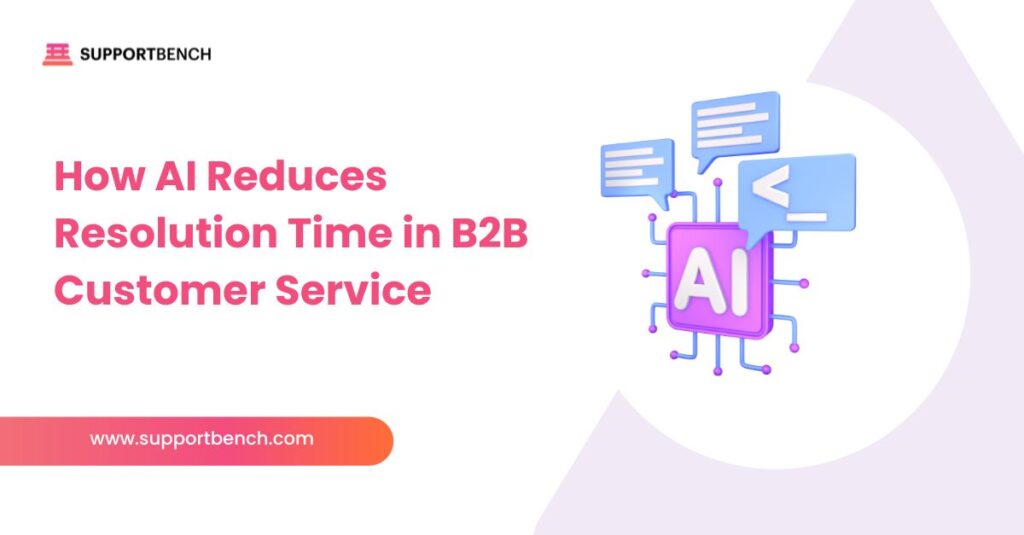B2B enterprises face a growing challenge: customer expectations are higher than ever, while support teams must resolve increasingly complex issues across multiple channels. Unlike B2C service, where interactions often involve one-off transactions, B2B customer service is about long-term partnerships, technical depth, and coordination across organizations.
Artificial Intelligence for B2B Customer Service has become a critical enabler of this shift. By reducing resolution times, supporting SLA compliance, and empowering proactive service, AI helps companies move from reactive firefighting to a customer success model that builds loyalty and scales globally.
Here’s how AI in B2B Support reduces resolution time for complex issues, strengthens knowledge management, drives personalization, and shapes the future of enterprise-level customer service.
At a Glance:
AI is reshaping B2B customer service by automating routine tasks, accelerating issue resolution, and enhancing SLA compliance. It enhances personalization, proactive support, and knowledge management, driving better customer satisfaction and business growth. Key benefits include faster resolutions, higher first-contact resolution, and increased agent efficiency.
What role does AI play in reducing resolution time for complex B2B support issues?
In B2B environments, resolving complex cases can involve multiple stakeholders, product configurations, and SLA-bound timelines. AI helps streamline every stage of this process — from intake to resolution — by automating routine tasks, prioritizing high-impact issues, and empowering agents with real-time intelligence.

1. Automating Routine Tasks
A large portion of enterprise support tickets consist of repetitive requests such as password resets, access errors, or installation steps. AI-powered chatbots and virtual assistants can resolve these instantly, freeing agents to focus on higher-value cases and keeping queues under control.
2. Intelligent Case Prioritization
Using natural language processing and historical trend data, AI evaluates ticket urgency, customer value, and contractual commitments to rank cases automatically. This ensures that business-critical issues move to the top of the queue and receive immediate attention, minimizing SLA risks.
3. Real-Time Agent Assistance
During live interactions, AI tools provide contextual recommendations drawn from past cases and knowledge bases. By suggesting next steps or pre-drafting responses, agents can resolve issues faster and with greater accuracy — cutting average handling time across the board.
4. Smart Routing and Escalation
AI eliminates manual triage by matching each ticket to the most qualified agent or team based on skill, workload, and issue type. When an escalation is required, the system reroutes the case automatically before deadlines are missed, ensuring seamless collaboration and SLA compliance.
Together, these capabilities reduce response delays, prevent bottlenecks, and help B2B support teams deliver faster, more consistent resolutions — even for the most technically demanding cases.
The New Architect of Customer Service Philosophy
AI has transformed the very foundation of enterprise customer service. Instead of reacting to problems after they occur, support teams can now anticipate issues, predict outcomes, and strengthen customer trust through proactive engagement.
From Reactive to Predictive Support
Traditional customer service focused on resolving tickets as they arrived. AI-driven platforms now identify early warning signals — such as usage anomalies, error patterns, or sentiment shifts — allowing teams to act before customers even raise a concern. This predictive capability reduces downtime and strengthens client confidence.
Proactive Communication and Transparency
AI enables automated updates and notifications based on ticket progress, SLA status, or potential risk factors. Clients stay informed throughout the process, improving transparency and satisfaction while reducing inbound status requests.
Redefining the Agent’s Role
As AI takes over repetitive triage and data retrieval, support agents move into more strategic roles. They become consultants and relationship builders who provide human insight, empathy, and expertise where automation cannot. This evolution elevates the support function from cost center to value driver.
AI, in this sense, is not just a productivity enhancer — it is reshaping the culture of customer service itself. The focus shifts from resolving issues to preventing them, from responding to requests to anticipating needs, and from transactional exchanges to enduring partnerships.
AI-Powered Knowledge Management
In complex B2B environments, information is often scattered across tickets, technical documents, and team silos — slowing down issue resolution. AI transforms knowledge management into a living, self-optimizing system that ensures every agent and customer has access to the most accurate, up-to-date information.

Automated Knowledge Creation and Maintenance
Each resolved case becomes a learning opportunity. AI analyzes patterns in agent responses and automatically creates or updates knowledge base (KB) articles, ensuring that critical information is never lost and repetitive inquiries are reduced over time.
Dynamic Content Optimization
Machine learning continuously reviews customer queries, article usage, and feedback to identify gaps or outdated content. It then recommends or executes updates automatically, allowing the knowledge base to evolve in real time with your products and customer needs.
Unified Access for Agents and Customers
By surfacing the right information at the right time, AI bridges the gap between internal and external knowledge. Agents resolve cases faster, while customers benefit from more accurate self-service — both of which drive higher first-contact resolution and consistency across global teams.
In essence, AI turns static documentation into a proactive support asset — one that grows smarter with every interaction and shortens resolution times across the enterprise.
Personalization and Proactive Support with AI
AI is redefining B2B customer service by transforming support from reactive problem-solving to intelligent partnership. Through predictive modeling and contextual awareness, it helps enterprises deliver personalized, anticipatory care that strengthens trust and long-term relationships.
Personalized Experiences at Scale
In B2B service, personalization extends far beyond knowing a customer’s name. AI analyzes historical interactions, product usage data, and account-level patterns to understand each client’s unique environment and priorities.
This insight enables agents to offer tailored recommendations, surface relevant resources, and anticipate follow-up needs — creating faster, more meaningful resolutions for every customer.
Proactive Issue Detection and Prevention
AI identifies potential risks before they escalate. By analyzing anomalies in performance logs, service tickets, or usage trends, it can alert teams to early signs of failure or workflow friction. Customers receive proactive outreach and preventive solutions, reducing downtime and eliminating the need for escalations.
Driving Continuous Engagement
Proactive communication—powered by AI insights—keeps customers informed through automated notifications, milestone updates, and renewal reminders. This transparency builds confidence and reinforces the perception of a partner who is always one step ahead.
The result is a fundamental shift in customer experience: from reactive troubleshooting to predictive care. Enterprises that harness AI for personalization and proactive support not only shorten resolution times but also deepen client loyalty and lifetime value.
Case Study: How Jenzabar Transformed B2B Customer Support with AI-Powered Efficiency
The impact of AI in enterprise support is best seen in real-world use. A strong example is Jenzabar, a leading provider of software and services for colleges and universities that modernized its complex support ecosystem using Supportbench.
The Challenge
Jenzabar managed hundreds of software products and served institutions with widely different needs and SLAs.
Over time, its legacy CRM-based helpdesk became increasingly difficult to maintain—especially after the departure of the sole administrator familiar with its internal configuration.
Without a flexible, unified platform, the support team faced three major challenges:
- High Complexity and Ticket Volume: Multiple product lines created overlapping cases and long resolution cycles.
- Fragmented Visibility: Sales, support, and product teams relied on separate data systems, slowing collaboration.
- Limited Agility: Customizing workflows or introducing new processes required technical intervention, delaying progress.
The Solution
After evaluating multiple vendors—including Freshdesk, Jira, and Zendesk—Jenzabar chose Supportbench for its deep CRM integration, advanced automation, and configurable AI features.
Key improvements included:
- Centralized Workflows: Unified ticket management and shared visibility for all departments.
- AI-Driven Automation: Intelligent routing, escalation, and summarization reduced repetitive work and manual tracking.
- Custom Configuration: Tailored data structures and dashboards reflected Jenzabar’s diverse client base and complex environment.
- Real-Time Analytics: Built-in dashboards provided leadership with immediate insight into SLA compliance and agent performance.
The Results
Following implementation, Jenzabar reported clear operational improvements, including:
- Faster resolution and response times due to automated workflows and AI-assisted ticket handling.
- Greater transparency and collaboration across teams via centralized dashboards.
- More consistent customer communication, improving trust and satisfaction among institutional clients.
By replacing its rigid CRM-based system with an adaptive, AI-powered platform, Jenzabar moved from reactive troubleshooting to a proactive, insight-driven support model—demonstrating how AI can deliver measurable impact in complex B2B environments.
The Future of AI in B2B Customer Service and Support
AI in B2B customer service is only at the beginning of its evolution. Over the next few years, the technology will shift from automation support to strategic orchestration—where AI becomes an operational partner that anticipates client needs, manages workflows, and ensures service quality across every channel.
1. From Automation to Orchestration
Today’s AI helps resolve routine tickets. Tomorrow’s systems will coordinate entire support ecosystems—predicting workloads, re-balancing agent queues, and triggering proactive outreach before service degradation occurs.
Enterprises will rely on these models to manage thousands of simultaneous client interactions without compromising response times or accuracy.
2. Large Language Models (LLMs) for Contextual Intelligence
Advanced LLMs, such as those powering Supportbench’s next-generation features, will continuously interpret customer intent, tone, and technical context.
They will enable more natural dialogue, precise classification of complex B2B issues, and automated documentation that feeds directly into the knowledge base—turning every resolved ticket into new institutional intelligence.
3. Predictive and Preventive Support
AI will increasingly identify early warning signals, such as unusual system behavior or recurring error patterns, allowing enterprises to intervene before clients experience downtime.
This evolution from reactive troubleshooting to predictive maintenance and customer assurance will shorten resolution time even further and strengthen contractual SLA compliance.
4. Multilingual and Global Scalability
As enterprises expand across markets, multilingual NLP and real-time translation will become integral to support operations. AI will allow consistent, high-quality responses across languages and time zones, eliminating the traditional cost of regional support centers.
5. Ethical and Transparent AI Governance
Future systems will embed governance frameworks that ensure explainability, data privacy, and ethical decision-making. For B2B enterprises handling sensitive client data, transparent AI behavior will be a differentiator and compliance requirement.
➤ In Perspective: The next wave of AI in enterprise support won’t just accelerate resolution—it will redefine how service organizations operate.
Platforms like Supportbench are already building toward this future: combining LLM-based understanding, predictive analytics, and adaptive workflows to help B2B teams deliver faster, smarter, and more accountable service at scale.
Key Metrics Impacted by AI in B2B Customer Service
AI’s influence on enterprise-level support is measurable. By automating triage, providing real-time insights, and improving cross-team visibility, it directly enhances the metrics that define operational excellence in B2B environments.
1. Mean Time to Resolution (MTTR)
AI shortens MTTR by routing cases to the right experts instantly, summarizing context for faster understanding, and suggesting next-best actions.
For teams managing complex, multi-stakeholder accounts, this improvement translates to measurable gains in both efficiency and SLA compliance.
2. First Contact Resolution (FCR)
With AI-driven recommendations and contextual knowledge retrieval, agents can resolve a higher percentage of tickets on the first response.
Supportbench’s AI summarization and dynamic workflows give agents immediate visibility into past interactions, reducing unnecessary escalations.
3. SLA Compliance and Escalation Rate
AI monitors SLA timers continuously, predicts potential breaches, and triggers proactive escalations before deadlines are missed.
This reduces the percentage of overdue tickets and strengthens contractual reliability—critical for enterprise-level relationships.
4. Customer Satisfaction (CSAT) and Sentiment
Faster, more accurate resolutions combined with proactive updates improve both measured CSAT and customer sentiment.
AI sentiment analysis allows managers to identify dissatisfied accounts early, enabling intervention before renewal risk emerges.
5. Agent Productivity and Utilization
By automating repetitive tasks—like ticket categorization and data entry—AI frees agents to focus on complex issues.
This raises utilization efficiency without expanding headcount, allowing leaders to scale output without proportional cost increases.
6. Scalability and Volume Handling
AI enables support operations to handle rising ticket volumes while maintaining or even improving performance metrics.
As Supportbench users have seen, intelligent routing and summarization make scaling from hundreds to thousands of tickets per day both feasible and measurable.
➤ In Summary: When implemented strategically, AI doesn’t just improve single performance metrics—it transforms how they interconnect.
Higher FCR leads to better CSAT; improved MTTR drives stronger SLA compliance; and increased agent efficiency supports scalable growth.
Platforms like Supportbench operationalize these relationships, turning data-driven insight into measurable customer success outcomes.
Conclusion
AI is more than a productivity tool; it is the cornerstone of a new era in B2B enterprise customer service. By automating routine tasks, prioritizing critical cases, assisting agents in real-time, and enabling proactive support, AI significantly reduces resolution times for complex B2B issues.
Knowledge management becomes dynamic, personalization reaches new levels, and customers benefit from proactive, predictive service. The result is faster resolutions, stronger relationships, and higher customer satisfaction.
Enterprises that embrace AI today will not only improve support efficiency but also position themselves as leaders in customer success tomorrow.
Ready to see AI in action? Learn how Supportbench can help your team automate tasks, prioritize cases, and deliver faster, more efficient B2B support. Book a free demo today.










